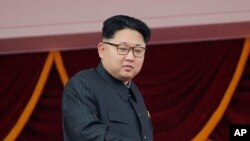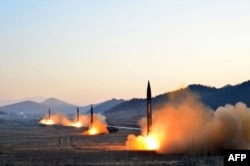A group of independent experts is calling for the government of North Korea to be brought before the International Criminal Court in The Hague for gross violations of human rights, including crimes against humanity.
The experts, who submitted their report to the U.N. Human Rights Council Monday, said the government has done nothing to end the widespread and systematic violations committed against its population since a U.N. commission of inquiry issued a damning report documenting horrific cases of abuse in that country in February 2014.
The experts said they used “the commission of inquiry report as a basis” on issues of accountability for human rights violations in DPRK (Democratic Peoples’ Republic of Korea) especially “where such violations amount to crimes against humanity.”
Sara Hossain, a legal expert from Bangladesh, told the council that it was the primary duty of the government itself “to bring perpetrators of violations in the country to account.”
Since that had not been done and “given the lack of impartiality and independence of the judiciary,” she said the only recourse was to seek justice in the international arena.
“In these circumstances, we call on the international community to continue to pursue a referral of the situation in the DPRK to the International Criminal Court.”
In view of the large number of reported crimes and perpetrators, she said, “We also recommend that other criminal accountability processes be undertaken. The groundwork for future criminal trials should be laid now.”
The U.N. experts also recommended the establishment of an ad hoc international tribunal, “which could act as a deterrent for future crimes.”
No access
North Korea did not allow the investigators access to the country, so they were obliged to gather evidence of gross human rights violations from a variety of witnesses, victims and other sources in Geneva, The Hague, Seoul, Tokyo and New York.
“We analyzed the issue in line with international law and prevailing State practice on accountability, and within the current political context,” said Sonja Biserko, a human rights expert from Serbia.
The current report was based on information gathered since August 2016 by the experts and Tomas Ojea Quintana, who was appointed special investigator on the human rights situation in North Korea in June 2016.
In his presentation, Quintana told the council that he feared the human rights situation in North Korea risked being overshadowed by “the raging tension on the Korean Peninsula and the northeast Asia region.”
"The focus on developments in the political and military arenas should not shield ongoing violations from the scrutiny of this council," he said. “There are no quick fixes or instant solutions to tackle human rights abuses of the scope and nature that has been reported for a very long time in the DPRK.”
The 2014 Commission of Inquiry report found that “The gravity, scale and nature of these violations reveal a state that does not have any parallel in the contemporary world.”
Quintana said that through a variety of sources he had found confirmation of appalling abuse and had gathered testimony from men and women who had left the DPRK in 2016.
“For thousands of people the clandestine journey out of the country is fraught with danger, including the risk of forced repatriation and imprisonment,” he said. “I was deeply touched by the courage and determination of those to whom I spoke.”
Military tensions
Quintana said he was very concerned about the escalation in hostilities on the Korean peninsula since the resumption of nuclear tests and missile launches by North Korea.
Quintana said he expected a new anti-missile defense system to be set up in South Korea with the support of the United States to prompt “threats of retaliation by the DPRK and reactions from other States.”
He said, “Military tensions have brought human rights dialogue with the DPRK to a standstill.”
Among the many violations documented in his report, the U.N. investigator expressed grave concern about the situation in the four prison camps still known to be operating in the country.
He estimated that these camps held at least 80,000 and up to 120,000 inmates and that the authorities had not taken any concrete steps to protect political prisoners from “the risk of torture in detention, forced labor and summary execution.”
North Korea boycotted the session and did not issue a “right of reply.”





